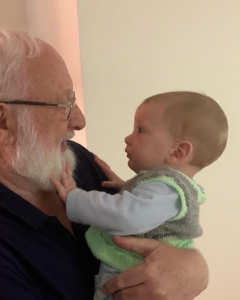
When I first became a granddad and saw my grandson for the first time, my heart filled with love. I held him in my arms; I wanted to play with him, to do something for him to make him feel good. I had never experienced such an emotion before that time.
Love is the reason we are here in this world; it is the reason why the world was created. Yet, unlike natural love, such as the instinctive love of a grandfather to a grandchild, among strangers, there is natural resistance, alienation, and enmity, rather than love.
However, life is formed precisely by overcoming these emotions. Every living being evolves by overcoming resistance and hardships. These “obstacles” create the need for growth and development. Had it not been for hardships and resistance, there would be no evolution and humans would never have come to be.
Feelings of separation from others, alienation, and enmity are therefore not negative emotions; they are levers for growth. We see them as negative when we don’t want to rise above them and grow. If, instead of rejecting them and fearing them, we would see them as opportunities to grow and develop ourselves, we would welcome them and benefit from them tremendously. Moreover, by rising above them, we would create a greater and tighter bond than the one we had before the appearance of those “hindrances.”
For example, think of the complexity of a unicellular creature compared to the complexity of the human body. They are incomparable. The reason for the creation of such a complex system as the human body is precisely the obstacles that all the levels of complexity encountered before they came to make a human organism. In a sense, therefore, we “owe” our lives, our existence, to the hatred and separation that appeared on the levels preceding ours.
This should teach us that we cannot eschew our duty to face the hatred that is being revealed among us today. Hatred appears for no other reason other than to promote evolution and greater union. If we avoid facing our resistance and uniting above the new and tougher level of hatred, we will hamper the evolution of our own species and pay heavily for it.
Our attitude toward the social crises plaguing our planet should therefore not be as natural as among family, but rather conscious and intentional. We should acknowledge that we do not feel like family, use family relations as an example to strive for, and try, together, to establish such relationships among us.
The key word here is “together.” Overcoming mutual alienation must be a mutual effort in which all parts of the population participate. Otherwise, one part will exploit the other and the whole feat will tumble like a deck of cards. We must install the awareness of how paramount it is that we form union above our separation until we truly feel as one family. Today, our lives, and the lives of our loved ones, depend on it.